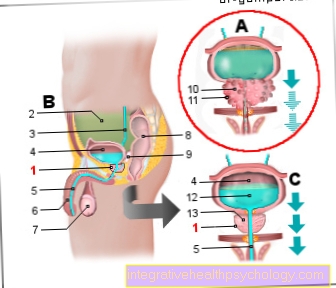Life expectancy with coronary artery disease
introduction
Life expectancy in coronary artery disease depends on many different factors. The number of coronary arteries affected by the disease and the location of the vascular constrictions are decisive for the prognosis. Depending on where and how pronounced the vascular constriction (stenosis) is, the disease manifests itself with symptoms of varying degrees.
The time of diagnosis also plays an important role in life expectancy. If you recognize CHD early on, you can effectively slow the progression of the disease with medication and a change in lifestyle.

What is the general life expectancy like?
The life expectancy with coronary heart disease has changed significantly in recent years. A few years ago almost every second patient died of a CHD-related heart attack, while today more than 80% of patients survive their first heart attack and can continue to live well thanks to medical care.
The reason for this lies in the massive advances in the medical treatment of coronary artery disease. There are highly effective drugs that effectively counteract the progression of coronary artery disease. The cardiac catheter examination, which can be used therapeutically with balloons and stents and can dilate narrowed vessels, is just as important and successful.
Depending on how pronounced the vascular strictures are, a bypass operation may be necessary to alleviate the symptoms. These medical advances give patients the chance, with targeted treatment and a healthier lifestyle, to stop the progression of coronary heart disease and to live with the best quality of life for many years despite the disease.
In the case of coronary artery disease, permanent treatment includes consistent control and reduction of risk factors. If you take the medication regularly and live a healthy lifestyle, patients have an almost normal life expectancy.
Read more on this topic at: The prognosis of coronary heart disease.
Which factors positively promote life expectancy?
There are good treatment options for coronary artery disease to slow the progression of the disease. Drug therapy is induced in almost every patient and must be taken consistently. So-called platelet inhibitors are taken to prevent blood clots and statins to protect blood vessels.
Additional medication may be necessary, for example for high blood pressure or heart failure. The medication is usually lifelong and must be strictly adhered to. In order to have a positive influence on life expectancy, a healthy lifestyle plays an important role in taking regular medication. The rule is that the so-called cardiovascular risk factors should be greatly reduced in everyday life. If possible, you should not smoke at all so as not to damage the vessels further. Regular exercise is healthy and you should decide with your doctor, if necessary, which sport and to what extent is suitable for you. Obesity should be reduced, ideally with exercise and a healthy diet. You should eat balanced and high-fiber foods. We recommend a Mediterranean diet with lots of fruit, vegetables, fish and healthy oils and little animal fats. You should avoid stress and try relaxation techniques such as autogenic training or yoga if necessary. A positive lifestyle has a positive effect on life expectancy and effectively protects the cardiovascular system.
In summary, you can have a positive effect on life expectancy with coronary heart disease if you strictly adhere to the medically prescribed therapy: regular medication and check-up visits to the doctor. Another elementary factor is a healthy lifestyle, which effectively promotes life expectancy. If you take therapy and lifestyle seriously, you can live with a good quality of life for many years.
Also read the article: Diet for heart disease.
How do drugs help?
In principle, drugs are only used as a secondary therapy. CHD patients should first try to lead a healthier life through a "change in life". With more exercise and a more balanced diet, the cholesterol levels are to be lowered so that the arteriosclerosis suffering is attenuated and thus CHD can be prevented.
In most cases, however, this approach is unsuccessful, so lipid-lowering agents that lower cholesterol are used. Blood thinners are also used to prevent a heart attack by preventing a thrombus from forming. In the case of acute angina pectoris, i.e. a strong feeling of tightness of the chest, as the CHD usually presents itself with heavy stress, so-called nitro spray is used. It contains nitrogen compounds that cause the blood vessels to widen. The blood can then flow better through the constricted coronary arteries and the feeling of tightness begins to ease.
Find out all about the topic here: The therapy of coronary heart disease.
Which factors / complications have a negative influence?
Coronary heart disease can deteriorate in its course if the therapy is not implemented in a targeted manner. Symptoms can worsen and serious complications, such as heart failure or a heart attack, can occur. The medication must therefore be taken as planned and check-ups with the cardiologist must be taken seriously. The same goes for lifestyle. It is important to eat healthily and get exercise. At the same time, obesity, nicotine and stress should be avoided in order to relieve the cardiovascular system. If you still smoke a lot, have stress and eat poorly, this promotes the progression of coronary artery disease.
If the coronary arteries are increasingly poorly supplied with oxygen, complications of CHD can occur. A heart attack can occur if certain areas of the heart are no longer adequately supplied with oxygen by the coronary arteries. In the long term, dangerous cardiac arrhythmias and cardiac insufficiency (heart failure) can result. The heart valves can be irreversibly, i.e. irreversibly, damaged, inflammation and effusion can also occur in the pericardium and embolism. The complications of untreated coronary artery disease are serious and can be life-threatening.
For more information, read on here: Heart attack.
How does nicotine consumption affect life expectancy?
Nicotine is regarded as a so-called independent risk factor for the development of coronary heart disease. This means that nicotine alone gives you a higher chance of developing CHD. Since CHD is in turn considered to be the origin of heart attack and stroke, the connection can be derived from this that nicotine consumption leads to increased calcification of the coronary arteries. This leads to a shortened life expectancy, since people with a pronounced CHD are significantly more likely to develop a heart attack and die earlier as a result.
Regardless of this, nicotine consumption also promotes the development of an extremely aggressive type of lung cancer that begins to metastasize early on.
Also read the article: Consequences of smoking.
How does being overweight affect life expectancy?
Obesity is still one of the risk factors for the development of coronary heart disease. Since it can be assumed that overweight people have less exercise and higher blood lipid levels. However, there is also a small group of people who would be classified as overweight due to increased muscle mass. This is why people have recently started to use the hip circumference as a risk factor.
The increased blood lipid levels, in turn, result in a greatly increased risk of arteriosclerosis and hence an increased risk of CHD. This in turn is associated with an increased risk of myocardial infarction, which correlates with an increased overall mortality. Of course, there are other factors that obesity brings with it, which are associated with a shortened life span.
Find out more about the topic here: Consequences of being overweight.
What can you do yourself to improve life expectancy?
In order to extend the life expectancy of coronary heart disease, it is essential to follow the instructions of the cardiologist and to take the medication consistently. You should have your blood pressure, blood sugar and blood lipids checked regularly. The cardiovascular risk factors should urgently be limited.
Those affected should stop smoking if possible and add fewer harmful substances to the body. A healthy, balanced diet is important and obesity should definitely be reduced. You should exercise regularly and get plenty of exercise. It can help to exchange ideas with other CHD patients. If you want to extend your life expectancy despite CHD, it is necessary to adopt a healthy lifestyle.





























